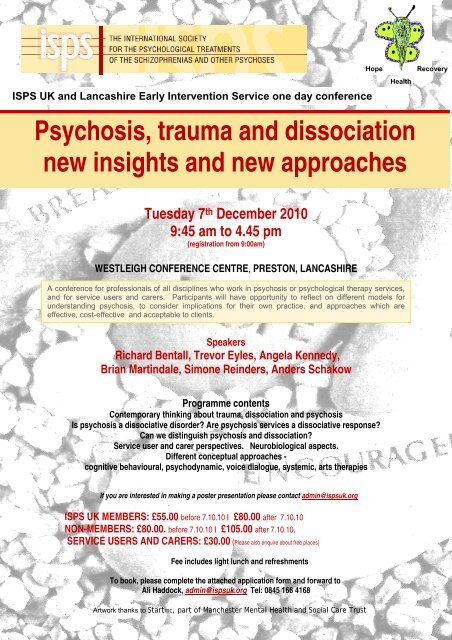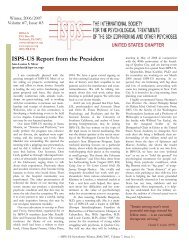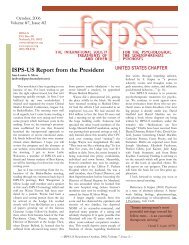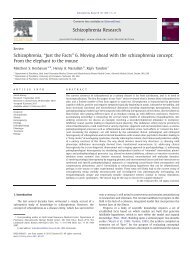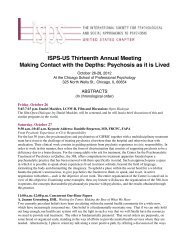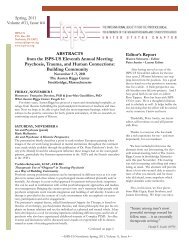Psychosis, trauma and dissociation new insights and new ... - ISPS-US
Psychosis, trauma and dissociation new insights and new ... - ISPS-US
Psychosis, trauma and dissociation new insights and new ... - ISPS-US
You also want an ePaper? Increase the reach of your titles
YUMPU automatically turns print PDFs into web optimized ePapers that Google loves.
<strong>ISPS</strong> UK <strong>and</strong> Lancashire Early Intervention Service one day conferenceHopeHealthRecovery<strong>Psychosis</strong>, <strong>trauma</strong> <strong>and</strong> <strong>dissociation</strong><strong>new</strong> <strong>insights</strong> <strong>and</strong> <strong>new</strong> approachesTuesday 7 th December 20109:45 am to 4.45 pm(registration from 9:00am)WESTLEIGH CONFERENCE CENTRE, PRESTON, LANCASHIREA conference for professionals of all disciplines who work in psychosis or psychological therapy services,<strong>and</strong> for service users <strong>and</strong> carers. Participants will have opportunity to reflect on different models forunderst<strong>and</strong>ing psychosis, to consider implications for their own practice, <strong>and</strong> approaches which areeffective, cost-effective <strong>and</strong> acceptable to clients.SpeakersRichard Bentall, Trevor Eyles, Angela Kennedy,Brian Martindale, Simone Reinders, Anders SchakowProgramme contentsContemporary thinking about <strong>trauma</strong>, <strong>dissociation</strong> <strong>and</strong> psychosisIs psychosis a dissociative disorder? Are psychosis services a dissociative response?Can we distinguish psychosis <strong>and</strong> <strong>dissociation</strong>?Service user <strong>and</strong> carer perspectives. Neurobiological aspects.Different conceptual approaches -cognitive behavioural, psychodynamic, voice dialogue, systemic, arts therapiesIf you are interested in making a poster presentation please contact admin@ispsuk.org<strong>ISPS</strong> UK MEMBERS: £55.00 before 7.10.10 | £80.00 after 7.10.10NON-MEMBERS: £80.00. before 7.10.10 | £105.00 after 7.10.10.SERVICE <strong>US</strong>ERS AND CARERS: £30.00 (Please also enquire about free places)Fee includes light lunch <strong>and</strong> refreshmentsTo book, please complete the attached application form <strong>and</strong> forward toAli Haddock, admin@ispsuk.org Tel: 0845 166 4168Artwork thanks to Startmc, part of Manchester Mental Health <strong>and</strong> Social Care Trust
<strong>Psychosis</strong>, <strong>trauma</strong> <strong>and</strong> <strong>dissociation</strong>: <strong>new</strong> <strong>insights</strong> <strong>and</strong> <strong>new</strong> approachesTuesday 7 th December 2010Westleigh Conference Centre, Lea Road, Preston PR4 0RB.Conference overviewLay opinion sees schizophrenia as a split personality, or a personality flipping between parts.Professionals have traditionally protested that this Jekyll <strong>and</strong> Hyde situation is not the case.Dissociation is a word used to describe varieties of experience in which parts becomeseparated from the whole personality; a self divided. States currently classified as dissociative(conversion) disorders in the World Health Organization's Classification include states thatwere once called hysterical, such as paralyses <strong>and</strong> fugues, but do not include schizophrenia orother psychoses. Dissociation may also be an everyday experience. We may all have times ofpsychic overload or the 'head too full syndrome' in which we feel unable to concentrate on thenext social task expected of us, <strong>and</strong> become preoccupied by a cacophony of internal events. .There is now evidence that both "<strong>dissociation</strong>" <strong>and</strong> "psychosis" are associated with variousforms of <strong>trauma</strong>. Could it be that psychosis <strong>and</strong> schizophrenia are best understood asdissociative experiences? Does therapy which addresses splitting <strong>and</strong> <strong>dissociation</strong> offer betterhope of recovery? This conference aims to bring together a diverse group of people seeking tointegrate multiple perspectives on this issue <strong>and</strong> explore possible ways forward.Conceptual <strong>and</strong> therapeutic overlaps between <strong>dissociation</strong> <strong>and</strong> psychosisDr Angela KennedyAngela will present evidence for role of <strong>dissociation</strong> in psychosis, <strong>and</strong> discuss what theories canbe drawn on to disentangle the two concepts, <strong>and</strong> implications for therapists.Dissociative disorders <strong>and</strong> schizophrenia: Similarities <strong>and</strong> differencesDr A.A.T.Simone Reinders <strong>and</strong> Andrew MoskowitzAs the DSM‐V schizophrenia committee is recommending that auditory hallucinations – acommon symptom in dissociative disorders <strong>and</strong> schizophrenia – be de‐emphasized in thefuture diagnostic criteria for schizophrenia, the time is right for a consideration of our currentknowledge about the overlap between the dissociative disorders <strong>and</strong> schizophrenia. In thispresentation, recent empirical research using rating scales, psychological instruments <strong>and</strong>cognitive tasks, to compare persons with dissociative identity disorder <strong>and</strong> schizophrenia, willbe reviewed. In addition, novel data from an ongoing study directed by Simone Reinders willbe presented for the first time. Research reveals areas of similarity between the disorders,particularly with regard to auditory hallucinations (probably a dissociative symptom) <strong>and</strong>childhood <strong>trauma</strong>, but also important differences, notably in (other) dissociative symptomssuch as amnesia, <strong>and</strong> in interpersonal relatedness <strong>and</strong> cognitiveNew approaches to working with voices in state‐run services.Trevor Eyles <strong>and</strong> Anders SchakowRecovery‐oriented practice has become the norm in Aarhus Kommunes’ social‐psychiatricservices. In respect of hearing negative/distressing voices, the aim has been to provide a broadspectrum of ideas from which the users themselves can choose, according to their own specific<strong>and</strong> respective needs. We work very closely with the service user. Main areas of focus are selfhelpgroups, systematic individual work (i.e. Maastricht Interview), or simple informal one‐toonesessions to identify options <strong>and</strong>/or problems. Results have persuaded management toestablish, <strong>and</strong> develop this area of work.
<strong>Psychosis</strong>: How to succeed <strong>and</strong> fail at creating a <strong>new</strong> realityDr Brian MartindaleBrian will be proposing that it is possible that <strong>dissociation</strong> / splitting (of too painful personalreality) is the central mechanism in all psychosis. Like Heinz products, splitting comes in atleast 57 varieties. The skill lies in recognising what is being dissociated <strong>and</strong> in which part of themind/ brain it is taking place <strong>and</strong> what mental processes are involved in further disguisingpersonal ‘reality’.Specific types of adversity affect specific cognitive <strong>and</strong> emotional processes, leading tospecific symptoms: The case of <strong>trauma</strong>, <strong>dissociation</strong> <strong>and</strong> hallucinationsProfessor Richard BentallFor the past century researchers <strong>and</strong> clinicians have attempted to explain severe mental illnessby trying to find common biological or psychological abnormalities underlying a wide range ofsymptoms grouped together under a single diagnosis such as 'schizophrenia'. This approachhas failed <strong>and</strong> there is growing evidence that specific types of unusual experiences ('symptoms'in the language of psychiatry) are the consequence of specific psychological <strong>and</strong> emotionalmechanisms, which in turn are influenced by events early in life. This talk will illustrate thisapproach by contrasting the processes involved in paranoid beliefs <strong>and</strong> hallucinatory voices,focusing on recent studies which show specific associations between <strong>trauma</strong>, <strong>dissociation</strong> <strong>and</strong>voices.
<strong>Psychosis</strong>, <strong>trauma</strong> <strong>and</strong> <strong>dissociation</strong>: <strong>new</strong> <strong>insights</strong> <strong>and</strong> <strong>new</strong> approachesTuesday 7 th December 2010Westleigh Conference Centre, Lea Road, Preston PR4 0RB.Conference workshopsThe workshops will offer participants chance to digest <strong>and</strong> discuss the morning’s presentations<strong>and</strong> to consider the topics from a particular theoretical perspective. Discussion will befacilitated by an individual with expertise in the area.WorkshopArts therapiesCognitive behaviouralPsychodynamicSystemicIssues for psychiatristsWorking with voicesFacilitatorSheila Gr<strong>and</strong>isonArt Psychotherapist <strong>and</strong> Borough Head of ArtsTherapies, East London NHS Foundation Trust.Warren LarkinLead Consultant Clinical Psychologist, EarlyIntervention Service, Lancashire Care NHS FoundationTrust.Brian MartindaleConsultant Psychiatrist, Chair of <strong>ISPS</strong> International <strong>and</strong>Hon President of the European Federation ofPsychoanalytic Psychotherapy.Jeni Webster <strong>and</strong> Judith VarleySystemic therapist in private practice, <strong>and</strong> carer.Christopher FindlayConsultant psychiatrist, Five Boroughs Partnership.Trevor EylesDevelopment Consultant, Social Psychiatric Services,Aarhus, Denmark.
<strong>Psychosis</strong>, <strong>trauma</strong> <strong>and</strong> <strong>dissociation</strong>: <strong>new</strong> <strong>insights</strong> <strong>and</strong> <strong>new</strong> approachesTuesday 7 th December 2010Westleigh Conference Centre, Lea Road, Preston PR4 0RB.Application formEarly bird rate (payment received by 7 th October)Non‐members £80.00 <strong>ISPS</strong> UK member £55.00 St<strong>and</strong>ard rateNon‐members £105.00 <strong>ISPS</strong> UK member £80.00 Service users <strong>and</strong> carers £30.00 (limited places only)A small number of free places are available for service users <strong>and</strong> carers – please contactadmin@ispsuk.org. As places are limited, please enquire early.To join <strong>ISPS</strong> UK <strong>and</strong> qualify for reduced rates, contact admin@ispsuk.orgTitle:______________ Name:_________________________________________________________Job Title: ______________________Organisation: ___________________________________Email address (please print clearly): ____________________________________________________Contact address: ______________________________________________________________Town: __________________________________________ Postcode__________________________Telephone (daytime): ________________________________________________________________Special dietary requirements: _________________________________________________________Access needs: _______________________________________________________________________Payment must be made at the time of booking by one of the following methods: cheque payable to <strong>ISPS</strong> UK bank transfer ‐ details on request credit card details:Card type: ………………………………..Start date: ………………………………..uName on card:……………………………Card number:………………………Expiry Date:………………………..3 digit security number:……………………..invoice: name/address for invoice if different from above……………………………………..……Please return to:Ali Haddock, Administrator, <strong>ISPS</strong> UK at admin@ispsuk.org<strong>ISPS</strong> UK, PO Box 7383, Bozeat, Wellingborough, Northants, NN8 9FB.Tel: 0845 166 4168


